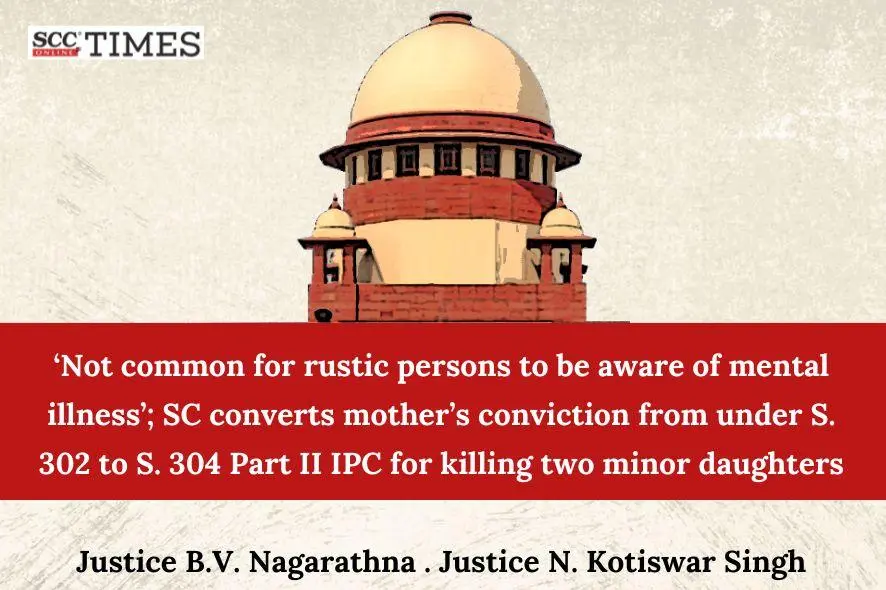Supreme Court: In a criminal appeal against Chhattisgarh High Court’s decision, whereby the conviction and sentence imposed on the present accused/ mother under Section 302 of the Penal Code, 1860 (‘IPC’) for killing her two minor daughters was upheld, the Division Bench of B.V. Nagarathna and N. Kotiswar Singh, JJ. partly allowed the appeal. The Court said that in the light of the strange, bizarre and inexplicable behaviour of the accused, there was no other plausible explanation that could be attached to her conduct in the given circumstances, other than to infer that she was under certain impaired mental condition which the accused described as being under the influence of invisible power.
Factual Matrix
The prosecution’s case was that the accused assaulted her two daughters, aged 5 years and 3 years, with an iron crowbar, leading to grievous injuries, thereby causing their deaths. The incident was witnessed by the sister-in-law of the accused/ PW-1, who also lived in the same house. Hence, an FIR was registered under Section 302 of the IPC.
The Trial Court, upon appreciation of evidence, concluded that based on the postmortem reports, the deaths of both daughters were due to serious injuries to their heads, caused by the accused mother. The Trial Court convicted the accused for the offence punishable under Section 302 of IPC and sentenced her to undergo imprisonment for life with a fine of Rs. 1000/- and in default of payment of fine, to undergo additional rigorous imprisonment for 1 month.
In the appeal, the High Court upheld the conviction of the accused under Section 302 of the IPC. The plea taken by the appellant before the High Court was that the prosecution failed to prove the case beyond a reasonable doubt and that the appellant was not in proper mental condition at the time of the commission of the offence. The High Court relied on the medical opinion of the Doctor and the postmortem reports which stated that the cause of death was cardiorespiratory arrest caused by intracerebral haemorrhage and injury to vital parts of brain, as a result of the head being hit by a hard and blunt object, thereby concluding that the nature of death was homicidal. Further, the High Court took into consideration the testimonies of the prosecution witnesses, seizure of the crime weapon and its FSL report to observe that the accused had assaulted her daughters with an iron pounder, causing grievous injuries leading to their death. Accordingly, the appeal was dismissed.
Analysis and Decision
Whether the death was caused by the accused mother?
Perusing the testimonies of the prosecution witnesses, including the sister-in-law’s statement that when she rushed towards the room upon hearing the scream of the accused-mother, she saw her hitting her younger daughter with an iron pounder while the elder daughter, was lying in bed unconscious, soaked in blood, the Court noted that no other person was present in the house at that time other than accused and her two daughters. Further, the Court noted that later, the accused was crying and saying that she had killed her two daughters.
Considering the said testimonies, seizure of the crime weapon, and the FSL report, which confirmed the presence of human blood, the Court found no infirmity in the finding given by the Trial Court as well as the High Court that the accused had assaulted both of her daughters, which caused grievous injuries, thereby causing their death.
Assessing whether the homicide was ‘culpable homicide’ or ‘culpable homicide not amounting to murder’ or ‘murder’, the Court referred to several authorities drawing difference between “murder” and “culpable homicide not amounting to murder”. The Court reiterated that one of the criteria to determine, whether the act amounts to “murder” or “culpable homicide not amounting to murder” is the presence or absence of intention of the offender. If the “intention” to cause death or to cause such bodily injury as is likely to cause death or the knowledge, which obviously has to be a conscious one, that it is so imminently dangerous that it must, in all probability, cause death or such bodily injury as is likely to cause death and commits such act “without any excuse” for incurring the risk of causing death or such injury, comes out a loud and clear in the case, it would be most appropriate to categorise it as a case of “murder” under Section 300 IPC in which event, penal provision of Section 302 IPC would be attracted. On the other hand, if the “intention” in causing the death or to causing such bodily injury is not so clear, the case will fall under the less stringent category of “culpable homicide not amounting to murder” as punishable under Section 304 IPC.
In the matter at hand, the Court said that the intention to homicide could be inferred considering the nature of the injuries received by the deceased daughters at the hands of the accused with an iron crowbar based on the medical and other evidence brought on record. However, the Court opined that it could not be conclusively held that the intention of the accused or conscious knowledge of what she was doing, a component of mens rea, was established beyond reasonable doubt.
Plea of Insanity
Noting that the accused took the plea of being under the influence of some invisible power, the Court said that Section 84 of the IPC, which provides for ‘act of a person of unsound mind’, was invoked. In light of Section 105 of the Indian Evidence Act, 1872 (‘Evidence Act’), the Court said that the burden of proof to prove the existence of such circumstances which would attract any of the pleaded exceptions is on the accused.
The Court pointed out that there is a difference between medical insanity and legal insanity. What Section 84 IPC provides is legal insanity as distinguished from medical insanity. In the absence of a precise definition of “unsoundness of mind” or the word “insanity”, they have been variously understood by Courts in varying degrees of mental disorder, and the Courts have applied this attribute to give the benefit of doubt or otherwise, depending on the facts and circumstances of the cases. However, mere odd behaviour or certain physical or mental ailments affecting the emotions or capacity to think and act properly have not been construed to be “unsound mind” within the scope of Section 84 of the IPC. All kinds of insanity as are understood are not covered under Section 84 of IPC, but only such acts, when committed by a person who was incapable of knowing the nature of the act or that he was doing which is either wrong or contrary to law, are concerned. As a consequence, only such mental or medical condition which affects or disturbs the faculty of the person which renders him unable to know the nature of act committed or that he was doing which he did not know that it was wrong or contrary to law can be given the benefit of insanity under Section 84 IPC, and thus escape criminal liability.
No evidence was adduced by the accused which would prove that she was of “unsound mind” within the meaning of Section 84 of IPC, nevertheless, the Court said that merely because the accused could not convey herself in a legally understandable expression or idiom of her mental condition to indicate the existence of legal insanity or prove such a condition and provide evidence, such a plea could not have been completely ignored by the Trial Court or by the High Court.
Considering that the incident happened in a rural setting and the accused not being highly educated, the Court opined that the possibility of confusing her unstable mental condition or temporary lapse of judgmental power bordering on temporary insanity could not be completely ruled out.
“It is not common for rustic persons to be aware of various mental disorders/illnesses such as schizophrenia, bipolar disorder, that may temporarily impair the mental condition of an individual. More often than not, these disorders are unrecognised and remain untreated as it may be difficult to identify the symptoms and they do not seek proper and timely medical intervention, resulting in such medical/mental conditions which can be misinterpreted or confused with spells or influence of invisible forces based on superstitions.”
The Court stated that “invisible influence” may be a symptom of such mental conditions referred to above. Additionally, prosecution had not adduced any evidence to prove any motive or intention behind the commission of the crime; hence, in cases raising concern about the mental stability of the accused, the existence or lack of motive assumes great significance. This is especially true in cases involving grave offences such as murder, where a complete absence of any kind of motive which ordinarily impels a person to commit such a crime may lend credence to the plea of insanity, as in the present case, where a mother took the life of her own children of tender age apparently in absence of any motive.
There can be no doubt that failure to unravel the true motivating factor for committing the crime cannot lead to the inference that the accused was innocent in the light of the evidence which may be brought on record, yet the Court should also not rush through to hold that the intention to commit the said offence was proved in the light of the peculiar facts and circumstances obtaining in the present case. Moreover, the Court noted that the accused had a cordial relationship with all the family members, including her children which clearly indicated absence of any ill feelings on the part of the accused to provide any basis for any motive to commit the crime which will prove the presence of “intention” to commit the act.
The Court observed that it was inexplicable and incomprehensible how a mother who loved her children and who had a cordial relation with her husband could resort to such a violent act and be attributed with the “intention to cause death” of her beloved children, except for coming under some influence or forces beyond her control as claimed by her. A mother is the life giver as well as the nurturer of a child.
Points to be considered while dealing with cases wherein such plea of invisible force is taken:
-
Even if the accused opts to remain silent, the Trial Court should ask such questions to the witnesses, as may be necessary to elicit the truth by invoking Section 165 of the Evidence Act, since the Court has to be satisfied that the offence alleged has been proved beyond reasonable doubt not only in respect of actus reas but also mens rea. This assumes great importance when the accused pleads the existence of certain circumstances which are beyond his/her control and which may indicate unsoundness of mind even temporarily, incapacitating the accused to take a conscious and informed decision.
-
If the accused at the time of commission of crime was incapable of making conscious and informed decision or was suffering from certain mental incapacity or unsoundness of mind even if temporarily, it may put a question mark on the “intention” of the accused in committing such a crime, in which event, the benefit of doubt may be extended to the accused as regards proof of intention and mens rea, as it would determine the nature of conviction and sentence which may be imposed.
Conclusion
Thence, in view of the plea taken by the accused that she was under the influence of some invisible power during the commission of the crime, a reasonable doubt arose regarding the existence of intention, thus of mens rea for causing death in the present case. The Court partly allowed the appeals and converted the conviction from Section 302 IPC to Part II of Section 304 IPC.
In light of the period spent in custody 9 years 10 months, the Court directed her to be released forthwith.
CASE DETAILS
|
Citation: Appellants : Respondents : |
Advocates who appeared in this case For Petitioner(s): For Respondent(s): |
CORAM :










